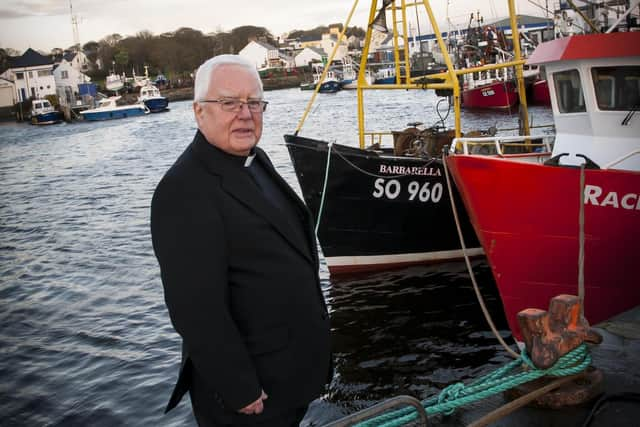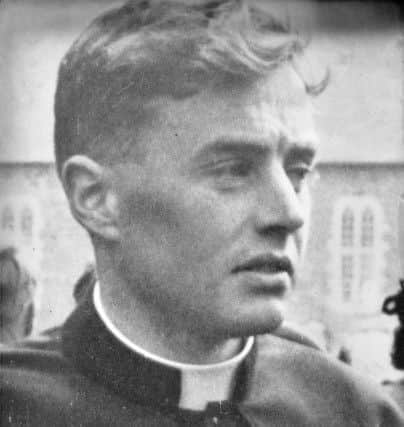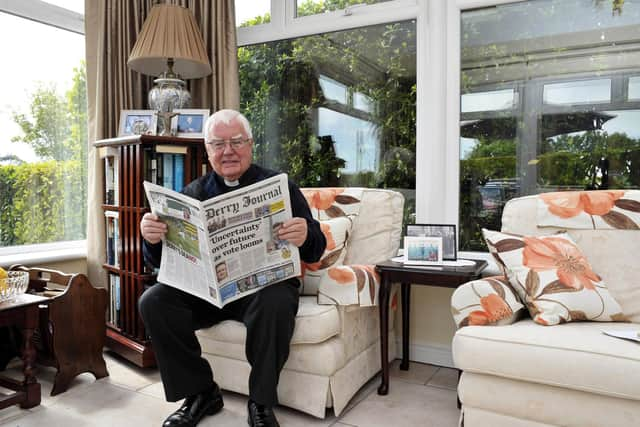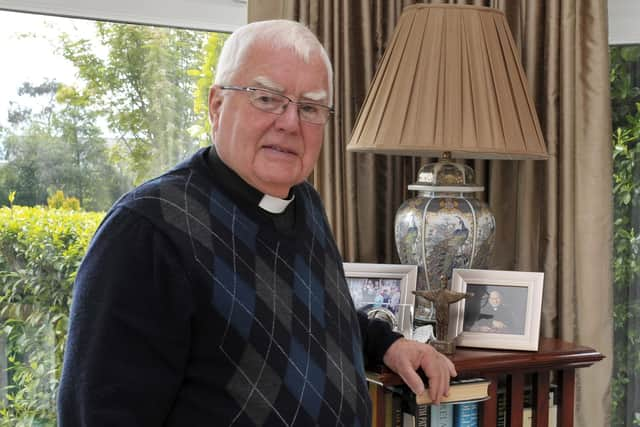Fr George McLaughlin was 'a man who had time for every thing and every body'
and live on Freeview channel 276
Father George McLaughlin passed away peacefully at Carndonagh Community Hospital on Friday last, aged 93.
Mourners who gathered for his funeral on Monday afternoon at St. Pius X Church, Moville - where he served from 1987 to 2007 before retiring to Greencastle- were told that he was “the man who had time for every thing and every body”.
Advertisement
Hide AdAdvertisement
Hide AdIn his Homily, Monsignor Andrew Dolan charted Buncrana native Fr McLaughlin’s many years ministering to, and living among, the people of Creggan, Long Tower and Pennyburn in Derry, Strabane, Ormeau Road in Belfast as well as Inishowen.


Ordained back in 1956, he personified, mourners were told, what it was to be a Catholic priest at the heart of the community in Ireland, but he also ministered at the coalface of a traumatised Derry at the height of the Troubles, for which there had been no handbook.
“I realise what I say will not do him justice but I’m also conscious Fr George would not like this to be a canonisation ceremony,” Msgr. Dolan said. “He was affectionately known as ‘Wee George’ to ourselves, but whatever about the physical stature of the man, he was in many ways larger than life itself and lived life to the full for as long as he was able.”
Msgr. Dolan recalled how the young George McLaughlin made his first journey into Derry in 1944 to study at St Columb’s College, where he was a contemporary of the boy who would later become Bishop of Derry, Dr Edward Daly. The two would become firm friends in adulthood and it was Fr George who introduced the Bishop to home and away matches at the Brandywell to watch his beloved Derry City F.C.
An extremely capable student, he was called to the College of Surgeons in Dublin but choose instead to follow his calling to the priesthood.


When the then new Creggan parish’s St Mary’s Church opened he was transferred there with Fr Joe Carlin and Fr Martin Mooney, in a tenure that was to last 18 years until 1978.
"Fr George got to know the area,” Msgr. Dolan said. “He got to know his parishioners because he walked the streets, knocked on doors, visited people, blessed their new homes and so on, typical of priests in the city at that time. In all of that a strong bond was established between priest and people, and in subsequent years that was so essential especially with the outbreak of the Troubles for when homes were being searched, arrests made and people were being interned, people turned to their priests and never found them wanting. People knew that Fr George and others were definitely in their corner.”
Fr. George was at one point during the Troubles arrested and spent two days at Ebrington barracks. He also came under a hail of gunfire himself as he carried the dead body of a young man shot dead by the British army, the priest told those gathered. “No preparation; no training for the priesthood could ever prepare a man for that type of mission. It wasn’t in the books then,” Msgr. Dolan said, adding:
Advertisement
Hide AdAdvertisement
Hide Ad"There was one memory imprinted in the minds of many of us of a certain vintage – Fr. George receiving the 13 bodies at St Mary’s Church in Creggan the night before they were buried. They were the victims of Bloody Sunday, including some of his parishioners.”


Whether it was there on Bloody Sunday, or when people under siege during the Troubles, or when the BSR closed and people were told their jobs were gone, Fr George stood with the people, and the people never forget. Indeed many of the young couples he married at St Mary’s stayed in touch with him throughout the decades.
In sentiments echoed towards the end of the Requiem Mass by Bishop Donal McKeown, Msgr. Dolan spoke of how it was important to record what priests in Derry and elsewhere were dealing with during those dark days of the Troubles, as it often went unsaid.
The Mass was concelebrated with Bishop Donal McKeown and parish priest Fr Eddie Gallagher, with dozens of brethern clergy in attendance.
Bishop McKeown told those gathered that as a young priest Fr George administered to a community ‘blessed with culture and hope’, but also one which was blighted by unemployment and poverty.


“Times were changing, and he changed with them. The awful years of the Troubles then saw parishes pulled in different directions, ministering Christ to the suffering but trying to build a sustainable future.
"For young priests coming out of the seminary at that stage, ill prepared as Fr Andrew said, for what was happening in the north, Fr George and others provided a formative environment where you could learn to administer grace amidst endless strife and sad news. Together they had to stumble through terrible events, trusting in the God who was hidden but active in the mess, in the fog of Conflict.”
Advertisement
Hide AdAdvertisement
Hide AdFollowing the Requiem mass, burial took place in the cemetery at Ballybrack.
